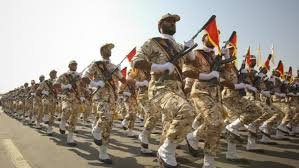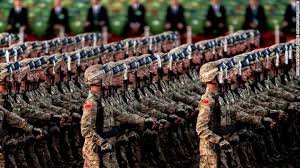World's Biggest Terrorist Organization Bans A Rival
Original:
US ban on anti-Iran militant group could have wide-ranging impact
Whilst there are over 100 definitions of terrorism, I'll go with the one Google are currently serving up:
'a person who uses unlawful violence and intimidation, especially against civilians, in the pursuit of political aims.'
Iranian terrorists:

Good people:

'Unlawful' is the keyword. This means outside of state sanctioned violence. When 'law' itself is founded upon violence and intimidation the term becomes superfluous. Under Statism if you choose not to vote (the false dichotomy) and/or not pay tax (tribune) it is not your law, it's their's. They will then visit their 'unlawful' violence upon you. Terrorists according to their definition. Knowing this is not the issue, accepting it's implications is.
So what does it mean if a State bans a 'terrorist' group? It means it has become some kind of threat to their monopoly on violence in their particular sphere of influence or, far more likely most the time, that flicking the switch from 'lawful' to 'unlawful' can assist in the complex chess game of outmaneuvering your Statist rivals.
The journalist writing this article believes 'The designation is not only timely, but it also provides the global support and legitimacy required for any crackdown"
In this context 'terrorist' IRGC Commander Mohammad Ali Jafari said, "If Pakistan fails to punish [Jaish al-Adl] in the near future, Iran will do so based on international law and will retaliate against the terrorists.”
International law is notoriously inconsistent and ultimately as flawed as individual State laws for the same reasons:
"A system of legal norms should be free of contradictions. The idea of justice is incompatible with an erratic interpretation and, subsequently, arbitrary application of norms. Systemic contradictions make actions by state authorities unpredictable. However, at the domestic as well as at the international level, considerations of power and interest have often made of the respective body of norms a “hermeneutical minefield.” The international legal order contains contradictions even between the most basic principles such as state sovereignty, self-determination and the rules of international humanitarian law. While, at the national level, the authority of constitutional courts may help to eliminate contradictions and inconsistencies, there exists, apart from limited regional arrangements, no such separation of powers at the international level. The article analyzes the systemic, destabilizing impact of normative contradictions in exemplary cases related to the interpretation of the UN Charter and the system of international humanitarian and international criminal law."
The U.S. has been desperately looking for ways to ratchet up confrontation with Iran. So rather than 'a confidence-building measure that could lead to negotiations and a new nuclear deal' there is the at least equal possibility that this 'positive signal from the United States to Iran' could be part of that game. 'Unlawful' Iran has been setup to potentially overreact to an attack emanating from 'lawful' Pakistan. Iran might consider these 'Greeks bearing gifts' rather cautiously, unlike Saddam Hussein who made a similar mistake in relation to his attack on Kuwait.
How quickly and easily such things could escalate and create the conflict that Statism feeds off. Will it happen this time, in this way? Who am I to say? One thing I can be relatively confident about - the State will almost always interpret 'lawful' in it's own favor, whether in domestic, or international affairs. Who's definition are you going to use?